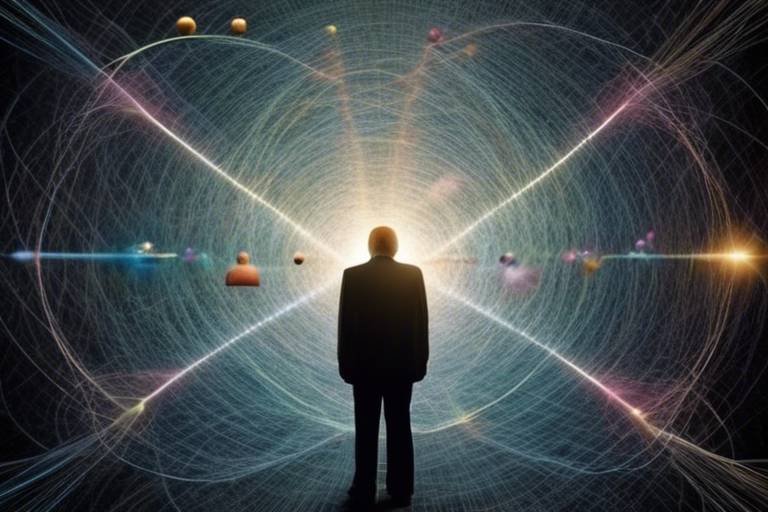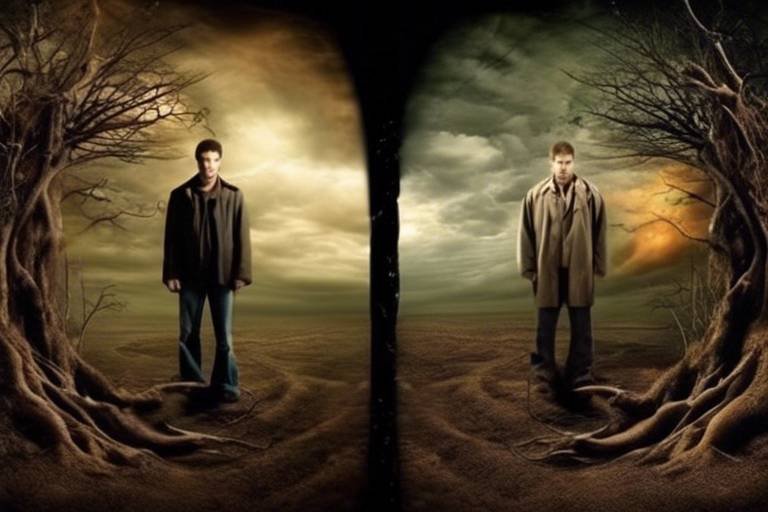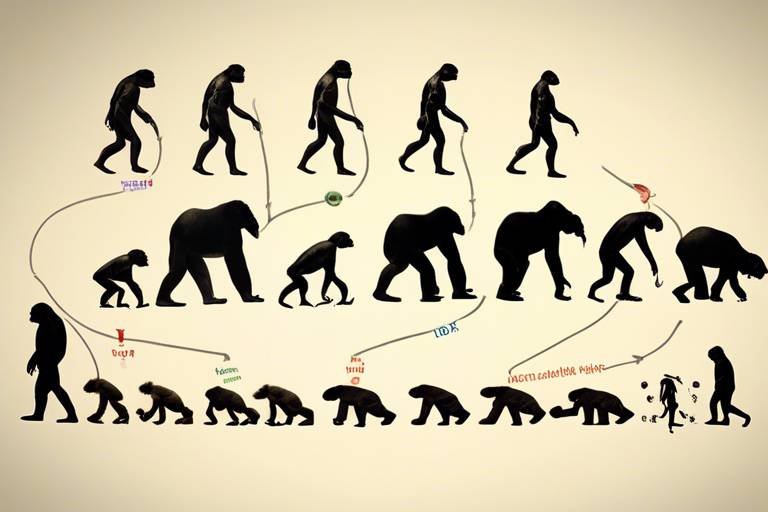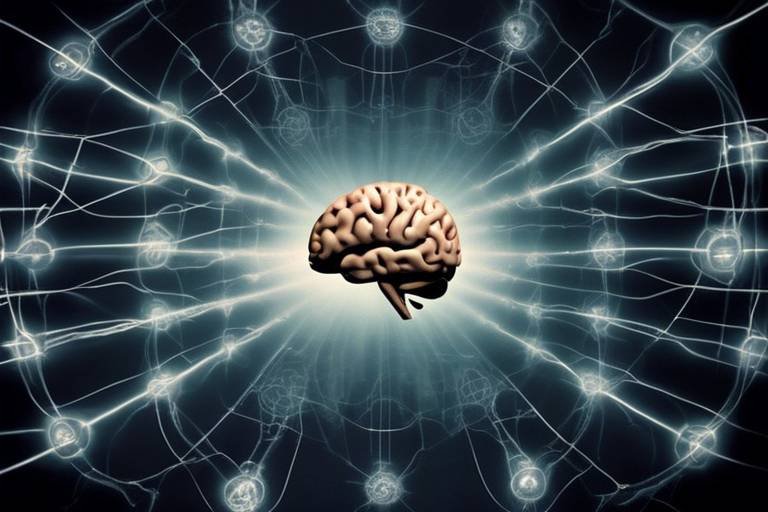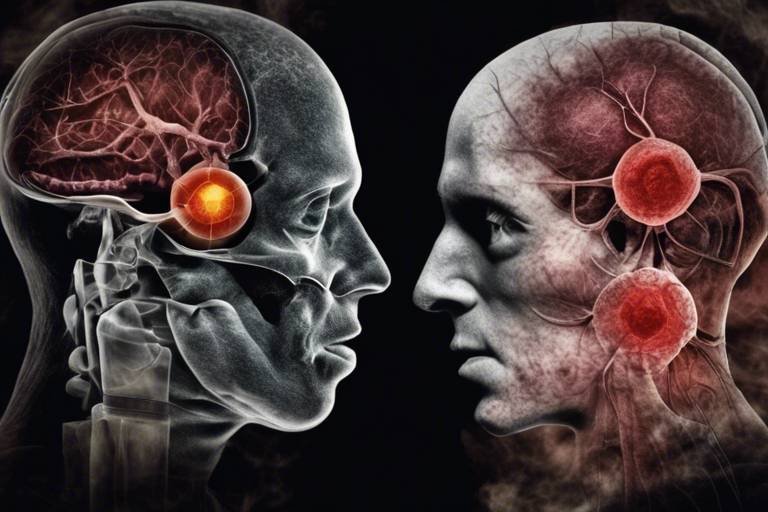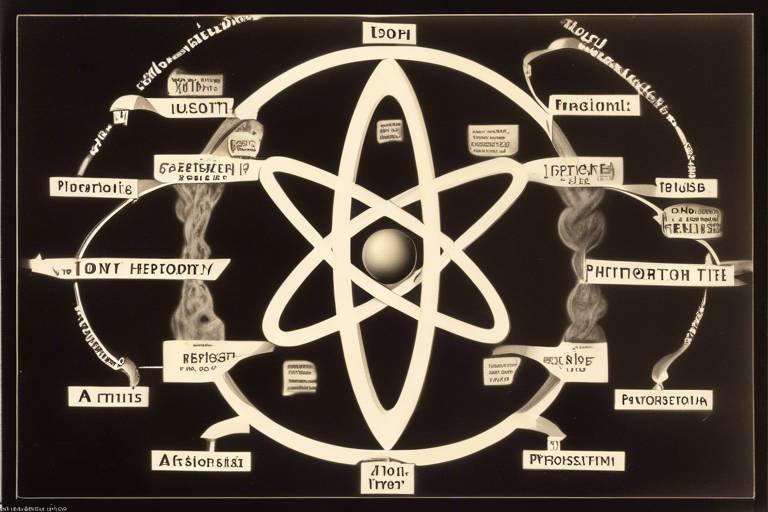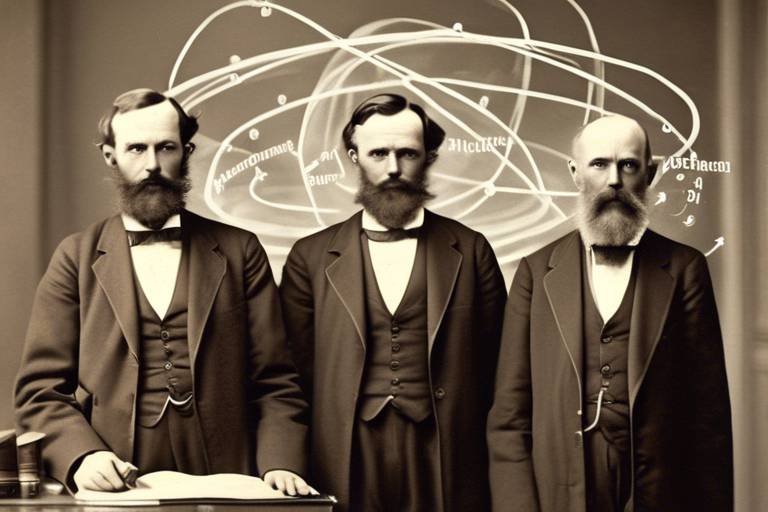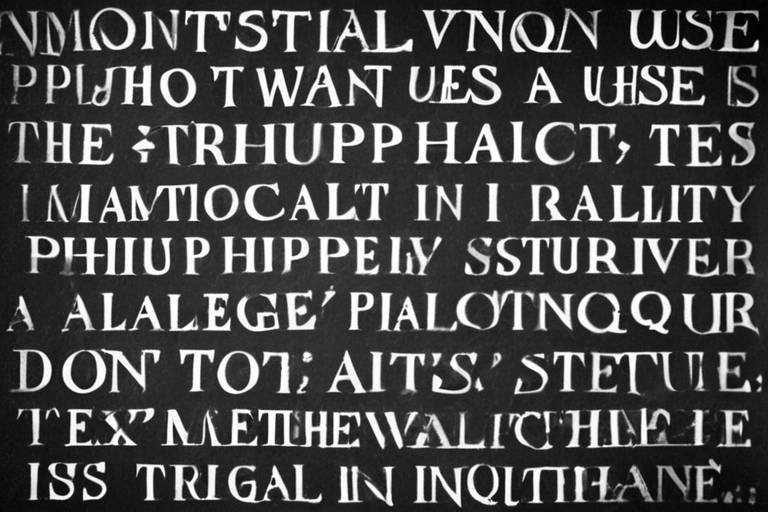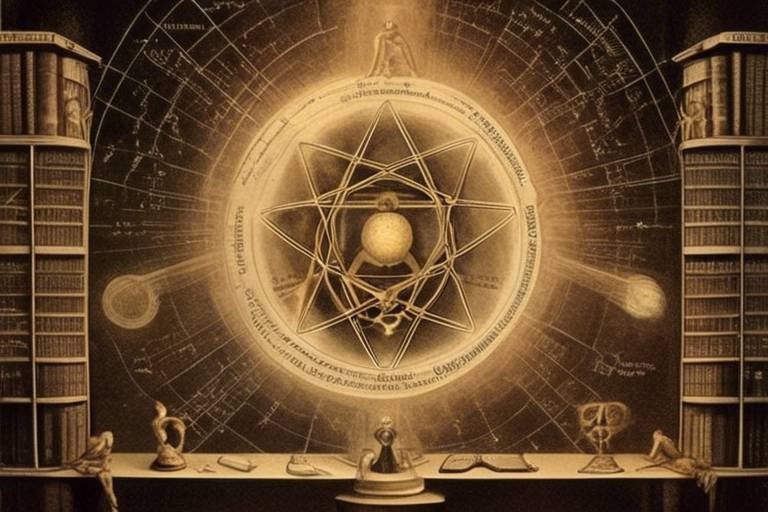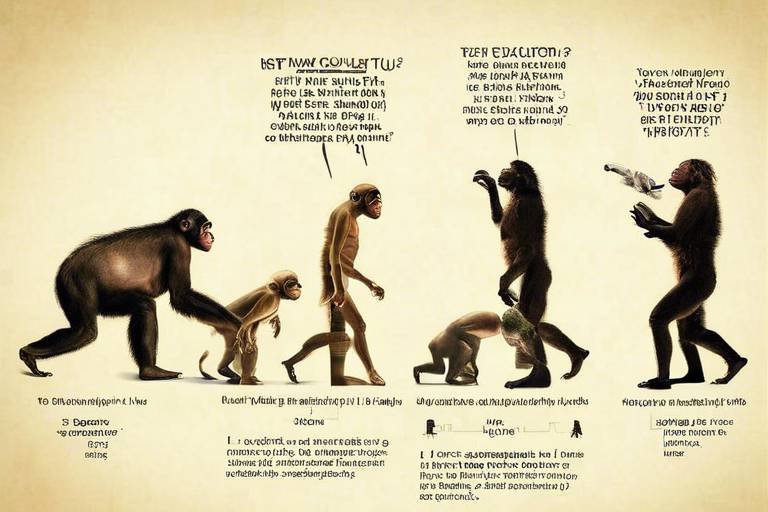The Hidden Philosophy in Quantum Field Theories
Quantum field theories (QFT) have revolutionized our understanding of the universe, opening doors to realms of thought that challenge our conventional perceptions of reality. This article explores the philosophical implications and interpretations of quantum field theories, revealing how they challenge traditional notions of reality, causality, and the nature of existence itself. Imagine standing at the edge of a vast ocean, where each wave represents a different possibility; this is how QFT invites us to view the universe—fluid, interconnected, and brimming with potential.
At the heart of quantum field theories lies a profound redefinition of reality itself. Traditional physics paints a picture of a deterministic universe, where every event is causally linked to a preceding one. However, QFT introduces us to the mind-bending concepts of quantum superposition and entanglement. In superposition, particles can exist in multiple states simultaneously, much like a coin spinning in the air, neither heads nor tails until it lands. This challenges our perception of the physical world as being fixed and absolute.
Entanglement further complicates this picture; it suggests that particles can be instantaneously connected, regardless of the distance separating them. This phenomenon raises the question: if two particles are entangled, does the act of measuring one affect the other, even if they are light-years apart? Such implications force us to reconsider the very fabric of reality and our place within it.
The philosophical debate between determinism and indeterminism is significantly influenced by quantum field theories. In a deterministic framework, everything is predictable, and the future is merely a consequence of the past. Yet, QFT introduces a level of probability and uncertainty that seems to undermine this certainty. For instance, the outcomes of quantum events can only be predicted probabilistically, leading to the conclusion that at the subatomic level, randomness reigns supreme.
This shift has profound implications for our understanding of free will and the nature of choice. If our universe is fundamentally indeterminate, what does that mean for our decisions? Are we merely players in a cosmic game of chance? These questions linger in the minds of philosophers and scientists alike.
One of the most intriguing aspects of quantum mechanics is the role of the observer. In classical physics, the observer is a passive entity, merely watching events unfold. However, in quantum mechanics, the observer's act of measurement plays a crucial role in determining the state of a system. This raises significant philosophical questions about objectivity and subjectivity in our understanding of the universe.
The measurement problem is a central issue in quantum mechanics, questioning how and when quantum states collapse into definite outcomes. Before measurement, particles exist in a superposition of states, but the act of observation forces them into a specific state. This phenomenon suggests that reality is not merely a collection of objective truths waiting to be discovered; rather, it is influenced by our perceptions and interactions. The implications of this are staggering—if reality is contingent upon observation, what does that say about our understanding of existence itself?
The observer effect illustrates how the act of observation influences a system. This concept prompts discussions about the nature of consciousness and its relationship to the physical universe. Are we, as conscious beings, integral to the fabric of reality, or are we merely observers of a pre-existing world? The interplay between consciousness and quantum mechanics opens up exciting avenues for exploration, blurring the lines between science and philosophy.
Various interpretations of quantum mechanics have emerged, each with its own philosophical ramifications. The Copenhagen interpretation suggests that quantum particles do not have definite properties until measured, while the many-worlds interpretation posits that every possible outcome of a quantum event actually occurs in a vast multiverse. The pilot-wave theory offers a deterministic approach, suggesting that particles are guided by hidden variables. Each of these interpretations presents a unique perspective on the nature of reality, prompting further inquiry into the philosophical implications of quantum mechanics.
Quantum field theories also challenge classical notions of causality. Traditionally, causality implies a direct relationship between cause and effect, but quantum mechanics introduces non-locality. This means that events can be correlated in ways that defy classical explanations, raising profound questions about the interconnectedness of particles and the nature of information transfer across distances. The implications of non-locality force us to reconsider our understanding of how events unfold in the universe, suggesting a more complex web of interactions than previously imagined.
Non-locality, as demonstrated by quantum entanglement, raises profound questions about the interconnectedness of particles and the nature of information transfer across distances. Imagine two entangled particles: changing the state of one instantaneously affects the other, no matter how far apart they are. This phenomenon challenges our traditional understanding of space and time, suggesting that the universe is far more interconnected than we once believed.
The ethical implications of quantum field theories cannot be overlooked. As our understanding of quantum mechanics advances, so too does our responsibility to use this knowledge wisely. The potential for manipulating quantum systems raises questions about scientific responsibility and the consequences of our actions. Are we prepared to handle the ethical dilemmas that arise from our newfound capabilities? The intersection of ethics and quantum physics is a crucial consideration for future generations of scientists and philosophers alike.
As we look to the future, the ongoing research in quantum field theories promises to further transform our understanding of existence, knowledge, and the universe itself. The philosophical implications of these theories will continue to challenge our perceptions and inspire new ways of thinking. The journey into the depths of quantum philosophy is just beginning, and as we navigate this uncharted territory, we must remain open to the surprises that await us.
- What are quantum field theories? Quantum field theories are frameworks in physics that describe the behavior of subatomic particles and the interactions between them through quantum mechanics.
- How do quantum field theories challenge traditional physics? They introduce concepts like superposition and entanglement, which defy classical notions of determinism and causality.
- What is the measurement problem? The measurement problem questions how and when quantum states collapse into definite outcomes upon observation.
- What are the ethical implications of quantum mechanics? The ethical implications revolve around the responsibility of scientists to use quantum knowledge wisely, especially regarding technology and manipulation of quantum systems.

The Nature of Reality
When we dive into the depths of quantum field theories, we find ourselves questioning the very fabric of what we perceive as reality. Traditionally, we’ve held a rather straightforward view of the universe: things exist in a specific state, and their properties can be measured and observed without any quirks. However, quantum mechanics throws a wrench into this neat little package, introducing us to concepts like quantum superposition and entanglement, which challenge our conventional understanding.
Imagine a world where particles can exist in multiple states at once, like a coin spinning in the air, neither heads nor tails until it lands. This is the essence of quantum superposition. It suggests that reality isn't as fixed as we once thought. Instead, it’s fluid and constantly in flux, influenced by our observations and interactions. This idea can be mind-boggling, making us wonder: if we can’t pin down a particle’s state until we measure it, what does that say about the nature of existence itself?
Moreover, consider quantum entanglement, which Einstein famously referred to as "spooky action at a distance." Here, particles become intertwined in such a way that the state of one instantly affects the state of another, no matter how far apart they are. This phenomenon raises profound questions about the interconnectedness of the universe. Are we all part of a grand tapestry, where every thread influences the others, or are we merely isolated entities in a chaotic sea of particles?
To further illustrate these concepts, let’s look at a simple table that summarizes how quantum field theories redefine our understanding of reality:
| Concept | Traditional View | Quantum View |
|---|---|---|
| Existence | Fixed and measurable | Fluid and probabilistic |
| Particle State | Defined and static | Superposition until measured |
| Interconnectedness | Independent entities | Entangled and interdependent |
As we grapple with these ideas, we must also confront the implications they have for our understanding of causality and the nature of truth. If reality is not as straightforward as we once believed, what does that mean for our quest for knowledge? Are we mere observers in a universe that operates beyond our comprehension? Or do we play a crucial role in shaping the reality we experience? These questions not only challenge our scientific paradigms but also invite us to explore the philosophical depths of our existence.
In conclusion, the nature of reality as presented by quantum field theories is not just a scientific inquiry; it’s a profound philosophical exploration. It encourages us to rethink our assumptions about the universe, urging us to embrace a more complex and interconnected understanding of existence. As we continue to unravel the mysteries of quantum mechanics, we may find ourselves not only redefining reality but also discovering deeper truths about ourselves and our place in the cosmos.

Determinism vs. Indeterminism
The philosophical debate between determinism and indeterminism has been a cornerstone of metaphysical inquiry for centuries, but the advent of quantum field theories has added a new layer of complexity to this age-old discussion. Traditionally, determinism posits that every event or state of affairs, including every human action, is the outcome of preceding events in accordance with the natural laws. In contrast, indeterminism suggests that not all events are determined by prior states, allowing for randomness and unpredictability. Quantum mechanics, with its inherent uncertainties, seems to favor indeterminism, challenging our classical understanding of a predictable universe.
At the heart of this debate lies the role of probability and uncertainty. In quantum mechanics, particles do not have definite positions or velocities until they are measured. Instead, they exist in a state of superposition, where they can be in multiple states at once. This leads to a fundamental question: if the universe is inherently probabilistic, can we truly claim to live in a deterministic world? The implications of this question ripple through various domains of thought, from science to ethics, as we grapple with the consequences of a universe that may not adhere to strict cause-and-effect relationships.
To illustrate the distinction, consider the following table that summarizes key differences between determinism and indeterminism:
| Aspect | Determinism | Indeterminism |
|---|---|---|
| Nature of Events | All events are predetermined by prior states. | Events can occur randomly and unpredictably. |
| Role of Probability | Probability is a measure of ignorance. | Probability is an inherent feature of reality. |
| Philosophical Implications | Suggests a clockwork universe. | Opens up discussions about free will. |
As we delve deeper into quantum field theories, we find that the concept of uncertainty becomes a pivotal player in this philosophical tug-of-war. The famous Heisenberg Uncertainty Principle states that we cannot simultaneously know both the position and momentum of a particle with absolute certainty. This principle not only underscores the limitations of our measurements but also suggests that at a fundamental level, the universe may be operating on a different set of rules than we previously assumed. This uncertainty challenges the deterministic view, forcing us to reconsider how we define causality and the nature of existence itself.
Furthermore, the implications of indeterminism extend beyond theoretical physics. They seep into our understanding of human behavior and decision-making. If our universe is inherently unpredictable, what does that mean for our sense of agency? Are we merely players in a cosmic game of chance, or do we still possess the ability to influence outcomes? These questions create a rich tapestry of philosophical inquiry, inviting us to explore the very fabric of reality.
In conclusion, the dialogue between determinism and indeterminism is far from settled. Quantum field theories have not only reshaped our understanding of physical phenomena but have also ignited profound philosophical debates about the nature of reality, free will, and the interconnectedness of all things. As we continue to explore the quantum realm, we may find that the answers to these questions are as elusive as the particles we seek to understand.

The Role of Observer
In the realm of quantum mechanics, the observer is not just a passive bystander but an active participant in the unfolding drama of reality. This concept challenges our traditional notions of objectivity, suggesting that the mere act of observation can significantly alter the outcome of an experiment. Imagine you’re watching a live performance; your presence and reactions can change the actors' performances. Similarly, in quantum mechanics, the observer's presence can influence the behavior of particles. This leads us to ponder: Is reality something we simply observe, or are we, in fact, co-creators of it?
The intricacies of this relationship become even more fascinating when we consider the measurement problem. When we measure a quantum system, we force it to 'choose' a state from the myriad possibilities it exists in prior to observation. This is akin to unwrapping a gift—until you peel away the wrapping, the contents remain a delightful mystery. The question arises: when does this 'gift' transition from potentiality to actuality? The implications of this are staggering, as they suggest that our understanding of reality is deeply intertwined with the act of observing it.
Moreover, the observer effect further complicates our understanding. It posits that the act of observing a quantum particle can change its state. For instance, consider a game of hide-and-seek played in a dark room. The moment you turn on the light to find your friend, their hiding place is revealed, and their position changes. In quantum terms, this means that the properties of particles are not fixed until they are measured. This leads to profound philosophical questions about the nature of consciousness and its role in shaping the universe. Are we merely spectators, or does our awareness contribute to the very fabric of reality?
To illustrate this complex relationship further, let's take a look at the following table that summarizes the key aspects of the observer's role in quantum mechanics:
| Concept | Description |
|---|---|
| Measurement Problem | The challenge of understanding how quantum states transition from multiple possibilities to a single outcome upon observation. |
| Observer Effect | The phenomenon where the act of measurement alters the state of a quantum system. |
| Consciousness | The philosophical inquiry into whether consciousness influences reality or merely observes it. |
In conclusion, the role of the observer in quantum mechanics is a profound and thought-provoking topic that invites us to reconsider our understanding of reality, existence, and the very nature of the universe. As we delve deeper into the mysteries of quantum field theories, we may find that the lines between observer and observed are not as clear-cut as they once seemed. Instead, they may be part of a larger tapestry that we are only beginning to comprehend.
- What is the observer effect in quantum mechanics?
The observer effect refers to changes that the act of observation can make on a quantum system, influencing its state and behavior. - How does the measurement problem relate to reality?
The measurement problem questions how and when quantum states collapse into definite outcomes, suggesting that reality may not be as fixed as we perceive it. - Can consciousness influence quantum events?
This remains a philosophical debate, with various interpretations suggesting different roles for consciousness in the quantum realm.

Measurement Problem
The is one of the most intriguing and perplexing issues in quantum mechanics, raising fundamental questions about the nature of reality itself. At its core, this problem revolves around the question: how do quantum states, which can exist in a superposition of multiple possibilities, collapse into a single outcome when measured? Imagine a spinning coin; while it spins, it is both heads and tails simultaneously. However, the moment you catch it, it reveals a definitive side. This analogy captures the essence of the measurement problem—how does the act of measurement force a quantum system to 'choose' a state?
To delve deeper, we must consider the implications of this collapse. The measurement problem suggests that there is a significant distinction between the quantum world, where particles can exist in multiple states, and the classical world we perceive, where objects have definite properties. This discrepancy raises philosophical questions about the nature of reality. Is the world inherently probabilistic, or do we simply lack the means to observe it accurately? Furthermore, the measurement problem leads us to ponder the role of the observer. Are we mere spectators in this cosmic play, or do our observations actively shape the universe?
Several interpretations of quantum mechanics attempt to address the measurement problem, each with its own philosophical ramifications. Here are a few notable ones:
- Copenhagen Interpretation: This widely accepted view posits that quantum mechanics does not describe an objective reality but rather our knowledge of it. Measurement plays a critical role in determining the state of a system.
- Many-Worlds Interpretation: According to this interpretation, all possible outcomes of quantum measurements actually occur, each in its own branching universe. This perspective eliminates the need for a collapse altogether.
- Pilot-Wave Theory: This deterministic approach introduces hidden variables that guide particles along definite paths, suggesting that quantum randomness is merely a reflection of our ignorance.
Each interpretation offers a unique lens through which to view the measurement problem, but none provides a definitive resolution. This ongoing debate highlights the profound philosophical implications of quantum mechanics, challenging our understanding of existence and reality. The measurement problem serves as a reminder that the universe is far more complex than it appears, inviting us to reconsider our assumptions about the nature of the world and our place within it.
As we continue to explore the depths of quantum mechanics, the measurement problem remains a focal point for both physicists and philosophers alike. It compels us to confront the limitations of our current understanding and to remain open to new ideas that may reshape our conception of reality.

Observer Effect
The is one of the most fascinating and perplexing phenomena in quantum mechanics. It refers to the principle that the act of observation can fundamentally alter the state of a quantum system. Imagine for a moment that you're a detective trying to solve a mystery. Every time you step into a room to examine the clues, your presence changes the dynamics of the scene. Similarly, in the quantum realm, when a particle is observed, its behavior can shift in ways that defy our traditional understanding of physics.
This phenomenon raises profound questions about the nature of reality itself. Are we merely passive observers in a universe that exists independently of us, or does our consciousness play an active role in shaping the physical world? To illustrate this, let's consider a well-known thought experiment: the double-slit experiment. When light is shone through two closely spaced slits, it creates an interference pattern, suggesting that light behaves like a wave. However, when we observe which slit the light passes through, the interference pattern disappears, and light behaves like a particle. This dramatic shift in behavior based on observation highlights the intricate relationship between the observer and the observed.
The implications of the observer effect extend beyond physics into the realm of philosophy. It challenges our understanding of objectivity and subjectivity. If observation can change outcomes, how can we claim to know anything with certainty? This uncertainty leads to a myriad of philosophical debates about the nature of knowledge and existence. Are our perceptions of reality merely constructs shaped by our observations? Or is there an objective reality that exists independently of our awareness?
Furthermore, the observer effect has significant implications for the field of quantum computing. In quantum computers, qubits can exist in multiple states at once, thanks to superposition. However, once they are measured, they collapse into a single state, which can affect the computational power and outcomes of quantum algorithms. This interplay between observation and quantum states is not just a theoretical concept; it has real-world applications that could revolutionize technology.
In summary, the observer effect serves as a reminder of the complex interplay between consciousness and the physical universe. It challenges us to reconsider our assumptions about reality, knowledge, and the limits of our understanding. As we delve deeper into the mysteries of quantum mechanics, we may find that the act of observing is not just a passive endeavor but a dynamic interaction that shapes the very fabric of existence itself.

Philosophical Interpretations
When we dive into the realm of quantum mechanics, we find ourselves not just grappling with complex mathematical equations but also wrestling with profound philosophical questions. The interpretations of quantum mechanics are as varied as they are fascinating, each one offering a unique lens through which to view the nature of reality. Let's explore some of the most prominent interpretations and their philosophical implications.
One of the most well-known interpretations is the Copenhagen interpretation, which posits that quantum particles exist in a state of superposition until they are measured. This leads to the idea that reality is not definite until observed, essentially suggesting that our consciousness plays a crucial role in shaping the universe. Imagine a world where your thoughts could influence reality—this interpretation tantalizingly suggests that might just be the case!
On the other hand, we have the Many-Worlds interpretation, which takes a completely different approach. Instead of collapsing into one reality upon measurement, every possible outcome of a quantum event actually occurs, each in its own parallel universe. This interpretation raises questions about the nature of existence itself: if every possibility is realized, what does that say about our choices and the significance of our actions? Are we merely players in a cosmic game with infinite versions of ourselves living out every possible scenario?
Then there’s the pilot-wave theory, which introduces a deterministic element back into quantum mechanics. It suggests that particles are guided by a wave function, providing a clear trajectory for their movements. This interpretation challenges the randomness often associated with quantum mechanics and reintroduces a sense of order to the universe. But it also begs the question: if everything is predetermined, do we truly have free will?
Each of these interpretations not only provides a different understanding of quantum mechanics but also opens up a Pandora's box of philosophical inquiries. They challenge our traditional notions of reality, causality, and even consciousness. The discussions surrounding these interpretations are not just academic; they touch upon the very essence of what it means to exist and to know. As we ponder these interpretations, we might ask ourselves: What is the nature of reality? Is it something we create, or is it an objective entity that exists independently of our perceptions?
In summary, the philosophical interpretations of quantum mechanics are a rich tapestry of ideas that provoke thought and debate. They compel us to reconsider our understanding of the universe and our place within it. As we continue to explore these theories, we may uncover insights that not only reshape physics but also redefine our very understanding of existence.
- What is the Copenhagen interpretation? The Copenhagen interpretation suggests that quantum particles exist in a state of superposition until measured, implying that observation affects reality.
- What does the Many-Worlds interpretation propose? This interpretation posits that all possible outcomes of quantum events occur, each in its own parallel universe.
- How does pilot-wave theory differ from other interpretations? Pilot-wave theory reintroduces determinism by suggesting particles are guided by a wave function, providing a clear trajectory for their movements.
- What philosophical questions arise from quantum interpretations? These interpretations challenge our understanding of reality, existence, free will, and the role of consciousness in shaping the universe.

Implications for Causality
When we dive into the realm of quantum field theories, we quickly find ourselves grappling with profound implications for our understanding of causality. Traditionally, we view causality as a linear relationship: cause precedes effect, and events unfold in a predictable sequence. However, quantum mechanics throws a wrench into this neatly organized view. With concepts like non-locality and quantum entanglement, we begin to see that the universe operates in ways that challenge our classical intuitions.
At the heart of this discussion is the realization that particles can be entangled, meaning that the state of one particle is directly related to the state of another, regardless of the distance separating them. This phenomenon raises a crucial question: if two entangled particles can instantaneously affect each other, what does that mean for our understanding of cause and effect? Are we witnessing a new form of causality that defies the limitations of space and time?
To illustrate this, consider the following scenario: imagine you have two entangled particles, A and B. If you measure particle A and determine its state, particle B will instantly take on a corresponding state, even if it is light-years away. This seems to imply that information can be transferred faster than the speed of light, which contradicts Einstein's theory of relativity. The implications of this are staggering; it suggests that the universe is interconnected in ways we are only beginning to understand.
Moreover, the traditional notion of causality is further complicated by the concept of quantum superposition. In a superposition, a particle exists in multiple states at once until it is measured. This leads to situations where the act of measurement itself determines the outcome, raising questions about whether causality is a fundamental aspect of reality or merely an emergent property of our observations.
In light of these phenomena, we must reconsider our philosophical stance on causality. Are we to accept a model of the universe where events are not strictly determined but are instead probabilistic? This shift in perspective invites a new framework for understanding the universe, one that embraces uncertainty and interconnectedness. The implications for fields such as philosophy, science, and even ethics are profound, as we navigate a world where the lines between cause and effect are blurred.
As we move forward, it becomes essential to explore how these quantum principles can influence our understanding of reality. Will we redefine causality to accommodate the strange behaviors observed at the quantum level? As we ponder these questions, we must remain open to the possibility that our universe may be far more intricate and interconnected than we ever imagined.
In summary, the implications of quantum field theories for causality challenge our traditional views and invite us to explore a universe where the connections between events are not always linear or predictable. This journey into the unknown not only expands our understanding of physics but also enriches our philosophical inquiries into the nature of existence itself.
- What is non-locality in quantum mechanics? Non-locality refers to the phenomenon where particles can be instantaneously connected, affecting each other's states regardless of the distance between them.
- How does quantum entanglement challenge classical causality? Quantum entanglement suggests that information can be shared between particles faster than the speed of light, which contradicts classical notions of cause and effect.
- What is quantum superposition? Quantum superposition is a principle where a particle exists in multiple states at once until it is measured, complicating our understanding of causality.
- How do these concepts affect our understanding of reality? These quantum principles suggest that reality may be interconnected in ways that defy traditional linear causality, leading to a more complex view of existence.

Non-locality and Entanglement
Non-locality and entanglement are two of the most fascinating concepts in quantum mechanics that challenge our traditional understanding of how particles interact across distances. Imagine two particles, once connected, that remain intertwined regardless of the space separating them. This phenomenon, known as quantum entanglement, suggests that the state of one particle is immediately linked to the state of another, no matter how far apart they are. It’s as if they share a secret language that transcends the limitations of space and time, leading us to question the very fabric of reality.
At first glance, this might sound like science fiction, but it’s a reality backed by rigorous experimentation. When two particles become entangled, a measurement performed on one particle instantly determines the state of the other. This instantaneous connection defies the classical notion of locality, which states that objects are only influenced by their immediate surroundings. Instead, quantum mechanics presents us with a world where particles can communicate faster than the speed of light, raising profound questions about the nature of information and causality.
To illustrate this, let’s consider the famous thought experiment known as Einstein-Podolsky-Rosen (EPR) paradox. Einstein himself was skeptical of quantum mechanics and famously referred to entanglement as “spooky action at a distance.” In this paradox, two entangled particles are separated by a vast distance, yet measuring the spin of one particle instantly gives us information about the spin of the other. This leads to a deeper inquiry into whether the particles possess definite properties before measurement or if they only acquire these properties upon observation. The implications of this are staggering, suggesting that reality may not be as objective as we once believed.
Furthermore, the concept of non-locality challenges our understanding of causation. In classical physics, causes must precede their effects and be connected in space and time. However, in the quantum realm, the connection between entangled particles appears to defy this rule. It raises the question: can we truly claim to understand causality if events can be correlated without a direct connection? This shift in perspective forces us to reconsider not just the mechanics of the universe, but also our philosophical interpretations of existence itself.
In summary, non-locality and entanglement are not just abstract ideas; they are gateways to understanding the universe in ways we never thought possible. They compel us to rethink our definitions of reality, causality, and the interconnectedness of all things. As we continue to explore these phenomena, we may uncover new dimensions of existence that challenge our most fundamental beliefs about the nature of the universe.
- What is quantum entanglement? Quantum entanglement is a phenomenon where two or more particles become interconnected in such a way that the state of one particle instantly influences the state of the other, regardless of the distance separating them.
- How does non-locality differ from classical physics? In classical physics, interactions are limited by the speed of light and require a direct connection in space and time. Non-locality allows for instantaneous correlations between entangled particles, challenging traditional notions of causality.
- What are the implications of entanglement for our understanding of reality? Entanglement suggests that reality may not be objective and that our observations can influence the state of particles, prompting philosophical debates about the nature of existence and consciousness.

Ethical Considerations
As we dive deeper into the realm of quantum field theories, it’s essential to pause and reflect on the that emerge from this complex landscape. The implications of manipulating quantum systems can be profound, raising questions not just about the science itself, but also about our responsibilities as stewards of this knowledge. Are we prepared to wield such power? What does it mean for our society and the future of technology?
The potential applications of quantum mechanics are exciting yet daunting. From quantum computing, which promises to revolutionize data processing, to quantum cryptography that could secure our communications, the possibilities seem endless. However, with great power comes great responsibility. The ethical dilemmas we face include issues of privacy, security, and equity. For instance, if quantum technologies are monopolized by a few corporations or governments, could this lead to a new form of inequality?
Moreover, the manipulation of quantum systems raises questions about the impact on human life. As we develop technologies that operate on quantum principles, we must consider the potential consequences of their use. For example, in the realm of medicine, quantum technologies could lead to breakthroughs in diagnostics and treatments, but they could also pose risks if misused. The ethical implications of such advancements must be carefully weighed against their potential benefits.
One significant concern is the responsibility of scientists and researchers in the field. As they push the boundaries of what is possible, they must also consider the moral implications of their work. This includes ensuring that their research is conducted ethically and that the consequences of their findings are communicated transparently to the public. The relationship between science and society is intricate, and scientists must engage with the broader community to foster understanding and trust.
Additionally, we must address the environmental impact of quantum technologies. While these technologies may offer solutions to energy efficiency and sustainability, the processes involved in their development and deployment could also have unintended consequences. It is crucial to evaluate the lifecycle of quantum technologies, from production to disposal, to minimize any negative environmental impacts.
In summary, the ethical considerations surrounding quantum field theories are multifaceted and complex. As we stand on the brink of a new technological era, it is imperative that we engage in thoughtful discussions about the responsibilities that come with our newfound capabilities. By doing so, we can ensure that the advancements we make in quantum physics benefit society as a whole and do not lead to unforeseen consequences.
- What are the main ethical concerns related to quantum technologies?
The primary concerns include privacy, security, equity, and the potential misuse of technology. - How can scientists ensure ethical practices in quantum research?
Scientists can engage with the community, communicate transparently, and consider the moral implications of their work. - What is the environmental impact of quantum technologies?
While they may offer sustainability solutions, the production and disposal processes can have unintended consequences that need to be evaluated.

The Future of Quantum Philosophy
As we stand on the precipice of a new era in scientific inquiry, quantum philosophy is poised to evolve in ways we can hardly imagine. The rapid advancements in technology, particularly in quantum computing and quantum communication, are not just reshaping our understanding of physics; they are also challenging our fundamental assumptions about existence, knowledge, and reality itself. So, what does the future hold for quantum philosophy?
One of the most exciting prospects is the potential for a deeper integration of philosophical inquiry with empirical research. As scientists continue to explore the bizarre phenomena of quantum mechanics, philosophers will have a unique opportunity to engage with these discoveries. This collaboration could lead to a more nuanced understanding of concepts like consciousness and reality, as researchers attempt to reconcile the abstract principles of quantum theory with the tangible experiences of human existence.
Moreover, the ongoing debate surrounding the interpretations of quantum mechanics—such as the Copenhagen interpretation, the many-worlds interpretation, and pilot-wave theories—will likely intensify. Each interpretation carries its own philosophical implications, and as new experimental evidence emerges, we may find ourselves reevaluating long-held beliefs about the nature of reality. For instance, if the many-worlds interpretation gains traction, it could fundamentally alter our understanding of choice and consequence, suggesting that every possible outcome of an event actually occurs in a parallel universe.
Importantly, as we delve deeper into the quantum realm, ethical considerations will also come to the forefront. The manipulation of quantum systems raises questions not just about what we can do, but what we should do. The development of quantum technologies could have profound implications for privacy, security, and even the nature of free will. Thus, a future in quantum philosophy must also address these ethical dilemmas, ensuring that scientific progress does not outpace our moral understanding.
To navigate this complex landscape, philosophers will need to adopt a more interdisciplinary approach, drawing insights from fields such as neuroscience, cognitive science, and even artificial intelligence. This cross-pollination of ideas could lead to groundbreaking theories that challenge our notions of determinism and indeterminism, as well as the role of observation in shaping reality. By embracing a holistic perspective, we may uncover new paradigms that redefine our understanding of existence itself.
As we look ahead, it’s clear that the future of quantum philosophy is not just about answering existing questions, but about posing new ones. What does it mean to exist in a quantum universe? How do we reconcile our subjective experiences with the objective realities proposed by quantum mechanics? These questions will push the boundaries of philosophical thought and inspire generations of thinkers to come.
Ultimately, the journey of quantum philosophy is just beginning. As we continue to explore the mysteries of the quantum world, we will undoubtedly uncover insights that challenge our deepest assumptions and expand our understanding of the universe. The future is bright, and the possibilities are as vast as the cosmos itself.
- What is quantum philosophy? Quantum philosophy explores the implications of quantum mechanics on our understanding of reality, existence, and consciousness.
- How does quantum mechanics challenge traditional philosophy? Quantum mechanics introduces concepts like superposition and entanglement, which challenge classical notions of determinism and causality.
- What are the ethical considerations in quantum research? Ethical considerations include the implications of quantum technologies on privacy, security, and the nature of free will.
- Will quantum philosophy influence future technologies? Yes, as quantum technologies develop, they will likely raise new philosophical questions that could influence their application and regulation.
Frequently Asked Questions
- What are quantum field theories?
Quantum field theories (QFT) are frameworks in physics that combine classical field theory, special relativity, and quantum mechanics. They describe how particles interact with each other through fields, fundamentally changing our understanding of matter and forces at the quantum level.
- How do quantum field theories redefine reality?
Quantum field theories challenge traditional views by introducing concepts like superposition and entanglement, suggesting that particles can exist in multiple states at once and be instantaneously connected regardless of distance. This fundamentally alters our perception of reality and the nature of existence.
- What is the measurement problem in quantum mechanics?
The measurement problem refers to the question of how and when quantum states collapse into definite outcomes during observation. It raises philosophical questions about the nature of reality and whether it exists independently of observation.
- What is the observer effect?
The observer effect describes how the act of measuring a quantum system can influence its state. This phenomenon prompts discussions about the role of consciousness in the physical universe and whether our observations shape reality.
- What are the main interpretations of quantum mechanics?
There are several interpretations of quantum mechanics, including the Copenhagen interpretation, which posits that particles don't have definite states until measured; the many-worlds interpretation, which suggests all possible outcomes occur in parallel universes; and pilot-wave theory, which introduces hidden variables to explain quantum phenomena.
- How do quantum field theories impact our understanding of causality?
Quantum field theories challenge classical notions of causality by introducing non-locality, where particles can be instantaneously connected. This raises profound questions about cause and effect, suggesting that events may not always follow a linear, predictable path.
- What are the ethical implications of quantum technology?
The ethical implications of quantum technology include concerns about scientific responsibility, privacy, and the potential consequences of manipulating quantum systems. As we advance in this field, it’s crucial to consider the societal impacts and moral responsibilities that come with such powerful tools.
- What does the future hold for quantum philosophy?
The future of quantum philosophy is exciting and unpredictable. Ongoing research may continue to transform our understanding of existence, knowledge, and the universe, prompting new philosophical inquiries and challenges as we delve deeper into the quantum realm.

